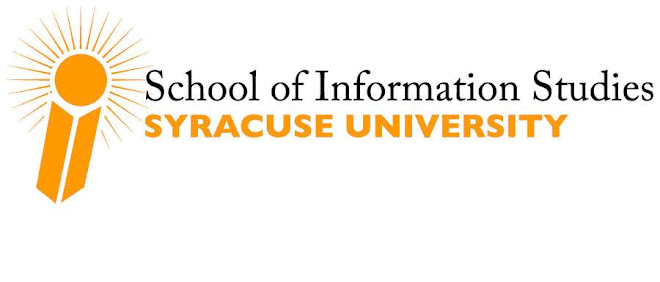Last night, there was pre-conference doctoral colloquium for outstanding Ph.D. students who participated in workshops with faculty from iSchools across the country on the UCLA campus.
Of the 30 doctoral students selected to present posters today, 10 are from the iSchool at Syracuse. Here's a quick overview of their presentations:
“Community Innovativeness”: A New Perspective on Knowledge Creation
Benjamin Addom
Syracuse University; bkaddom@syr.edu
Topics: Community techologies and networking, Information technology and services for under-addressed communities
Keywords: Community Informatics, Innovation, Knowledge Generation
Older Adults and Information Technology: The Current State of Research and Future Directions
Johanna L. H. Birkland and Michelle L. Kaarst-Brown
Syracuse University; jlbirkla@syr.edu
Topics: Information technology and services for under-addressed communities
Other Keywords: older adults, seniors, elderly, information technology
Towards a Data and Workflow Collaboratory for Research on Free and Open Source Software and its Development
James Howison, Kevin Crowston, and Megan Conklin
Syracuse University; Elon University; jhowison@syr.edu
Topics: Information infrastructure development, Preserving digital information
Keywords: cyberinfrastructure, repositories
Towards a Model of Determinants of Web Services Platform Adoption by Complementers
Joseph B. Rubleske
Syracuse University; jrublesk@gmail.com
Topics: Information infrastructure development
Keywords: software platforms, web services, adoption, network effects, complementarities
Stability and Change in Self-organizing Technology-supported Groups: Evidence from Genres of Communication in Free and Open Source Software Development
James Howison
Syracuse University; jhowison@syr.edu
Topics: Community techologies and networking
Other Keywords: genres of online communications, distributed teams, organizational change
Deriving Ontology from Folksonomy and Controlled Vocabulary
Miao Chen and Jian Qin
Syracuse University; mchen14@syr.edu
Topics: information organization
Keywords: Ontology, folksonomy, tag, controlled vocabulary, vector space
Proposal of Document Classification with Word Sense Disambiguation
Xiaozhong Liu
Syracuse University; xliu12@syr.edu
Topics: information organization
Other Keywords: Document classification, WSD, NLP
Group Maintenance Behaviors in Self-organizing Distributed Teams
Na Li, Michael John Scialdone, Robert Heckman, and Kevin Crowston
Syracuse University; nli@syr.edu
Topics: Community techologies and networking
Keywords: Group maintenance, self-organizing distributed team, FLOSS, politeness theory, content analysis
Conversation Repository for Participatory Librarianship
Keisuke Inoue
Syracuse University; kinoue@syr.edu
Topics: Community techologies and networking, information organization
Keywords: information seeking behavior, information retrieval, Web 2.0, discourse analysis, conversation theory
Behavorial Parameters of Trustworthiness for Countering Insider Threats
Shuyuan Mary Ho
Syracuse University; smho@syr.edu
Topics: Information assurance and security
Keywords: trustworthiness, insider threats, personnel anomaly detection
Of the 30 doctoral students selected to present posters today, 10 are from the iSchool at Syracuse. Here's a quick overview of their presentations:
“Community Innovativeness”: A New Perspective on Knowledge Creation
Benjamin Addom
Syracuse University; bkaddom@syr.edu
Topics: Community techologies and networking, Information technology and services for under-addressed communities
Keywords: Community Informatics, Innovation, Knowledge Generation
Older Adults and Information Technology: The Current State of Research and Future Directions
Johanna L. H. Birkland and Michelle L. Kaarst-Brown
Syracuse University; jlbirkla@syr.edu
Topics: Information technology and services for under-addressed communities
Other Keywords: older adults, seniors, elderly, information technology
Towards a Data and Workflow Collaboratory for Research on Free and Open Source Software and its Development
James Howison, Kevin Crowston, and Megan Conklin
Syracuse University; Elon University; jhowison@syr.edu
Topics: Information infrastructure development, Preserving digital information
Keywords: cyberinfrastructure, repositories
Towards a Model of Determinants of Web Services Platform Adoption by Complementers
Joseph B. Rubleske
Syracuse University; jrublesk@gmail.com
Topics: Information infrastructure development
Keywords: software platforms, web services, adoption, network effects, complementarities
Stability and Change in Self-organizing Technology-supported Groups: Evidence from Genres of Communication in Free and Open Source Software Development
James Howison
Syracuse University; jhowison@syr.edu
Topics: Community techologies and networking
Other Keywords: genres of online communications, distributed teams, organizational change
Deriving Ontology from Folksonomy and Controlled Vocabulary
Miao Chen and Jian Qin
Syracuse University; mchen14@syr.edu
Topics: information organization
Keywords: Ontology, folksonomy, tag, controlled vocabulary, vector space
Proposal of Document Classification with Word Sense Disambiguation
Xiaozhong Liu
Syracuse University; xliu12@syr.edu
Topics: information organization
Other Keywords: Document classification, WSD, NLP
Group Maintenance Behaviors in Self-organizing Distributed Teams
Na Li, Michael John Scialdone, Robert Heckman, and Kevin Crowston
Syracuse University; nli@syr.edu
Topics: Community techologies and networking
Keywords: Group maintenance, self-organizing distributed team, FLOSS, politeness theory, content analysis
Conversation Repository for Participatory Librarianship
Keisuke Inoue
Syracuse University; kinoue@syr.edu
Topics: Community techologies and networking, information organization
Keywords: information seeking behavior, information retrieval, Web 2.0, discourse analysis, conversation theory
Behavorial Parameters of Trustworthiness for Countering Insider Threats
Shuyuan Mary Ho
Syracuse University; smho@syr.edu
Topics: Information assurance and security
Keywords: trustworthiness, insider threats, personnel anomaly detection


No comments:
Post a Comment